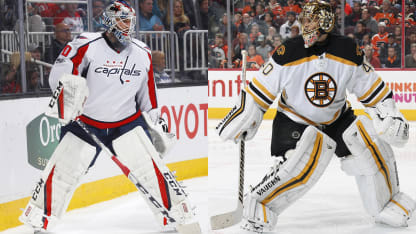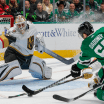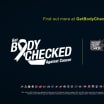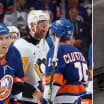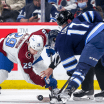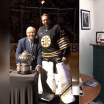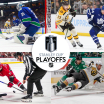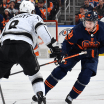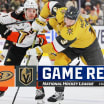None of that surprises Ted Monnich, a former minor pro goaltender who works as a sports psychology consultant and mental skills coach for goalies of all levels in North America and Europe. Monnich, who has consulted with the Carolina Hurricanes and their American Hockey League affiliate in Charlotte, North Carolina, began tracking the links between guitars and goalies in 2003 after noticing his own increased glove-hand agility and performance after practicing the guitar. He tracked minor pro goalies and found glove-save response and save percentage increased after practicing guitar a few hours prior to games, something he calls kinesthetic response.
"When we look at what a musician is doing, either reading music or having memorized music, they are responding with their hands to a trigger," Monnich said. "The goalie's trigger is seeing the puck come off the stick. The musician's trigger is usually the preceding bar or stanza of music, hearing it, hearing the patterns, and that triggers the next response in their hands. We are dialing in a portion of the central nervous system that does the same thing, or has some relation. One reinforces the other. Playing music reinforces catching pucks."
It isn't limited to the guitar, though that does seem to be the instrument of choice for goalies.
New York Rangers goalie Henrik Lundqvist once ripped through "Sweet Child O' Mine" by Guns N' Roses on "The Tonight Show Starring Jimmy Fallon." Ryan Miller of the Vancouver Canucks, Mike Smith of the Arizona Coyotes, and Cory Schneider of the New Jersey Devils all play, as did former NHL goalies Jose Theodore, Brent Johnson and Robert Esche. Most view the guitar as a release, a way to relax, but like Holtby, ex-NHL goaltender Sean Burke, who once jammed onstage with Garth Brooks, would sometimes bring his guitar on the road to play.
"I think music in general helps," Holtby said. "Keeping a beat, feeling that rhythm, it's in a lot more things than people think."
Tuukka Rask of the Boston Bruins learned to play drums at age 9 in a music class in Finland, and started playing again when he moved to North America to begin his pro career 10 years ago.
"It's coordination so I am sure there is something to it," Rask, 30, said of the similarities.
